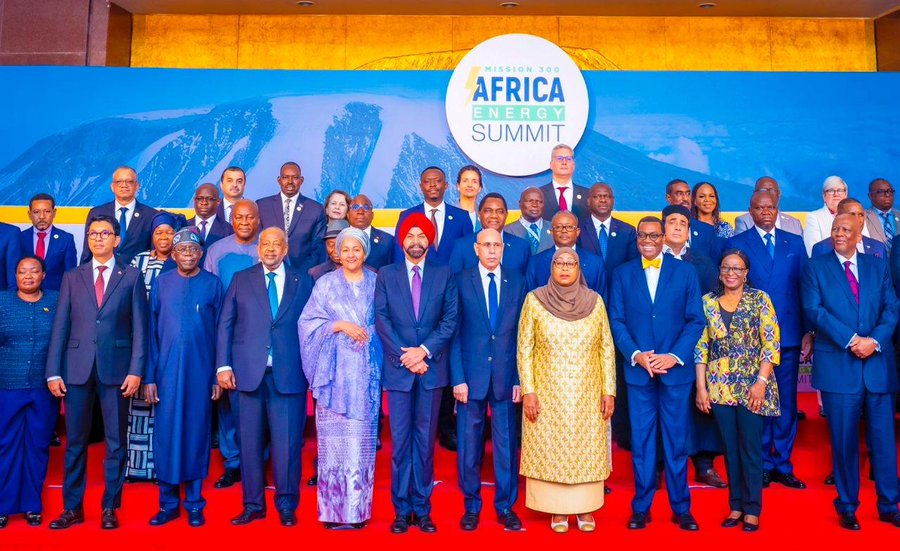President Bola Tinubu has concluded his official visit to Dar es Salaam, Tanzania, where he participated in the Mission 300 Africa Energy Summit alongside other African leaders.
The summit, organised by the Tanzanian government in collaboration with the African Union, the African Development Bank (AfDB), and the World Bank, focused on addressing Africa’s energy challenges and achieving electricity access for 300 million people by 2030.
The highlight of the two-day event was the adoption of the Dar es Salaam Declaration, which outlines strategies for improving energy access across the continent.
Leaders from 12 countries, including Nigeria, Chad, Côte d’Ivoire, and Zambia, signed the Declaration, committing to provide electricity to their unelectrified populations through National Energy Compacts tailored to their specific needs.
In a speech delivered by Nigeria’s Minister of Power, Adebayo Adelabu, President Tinubu emphasised the importance of collective action to bridge Africa’s energy gap.
READ ALSO: Judicial in Elections: APC tags Atiku ‘prolific electoral litigator’
He reiterated Nigeria’s commitment to delivering reliable, affordable, and sustainable electricity to its citizens by 2030.
“This is an ambitious goal, but together we can achieve it,” President Tinubu said. “Let us work to create a future where every African can access reliable and affordable energy, industries thrive, economies grow, and our people prosper.”
President Tinubu highlighted significant progress in Nigeria’s energy sector, attributing the achievements to partnerships with international organizations.
He acknowledged AfDB’s $1.1 billion investment aimed at providing electricity to 5 million Nigerians by 2026, as well as a $200 million investment under the Nigeria Electrification Project, set to benefit 500,000 people by 2025.

The President also announced future initiatives, including AfDB’s planned $700 million investment in Nigeria’s Desert to Power programme and $500 million for a Grid Battery Energy Storage System, expected to provide electricity to an additional 2 million people.
Furthermore, the World Bank’s $750 million project will expand distributed energy access, powering 16.2 million Nigerians through mini-grids and standalone solar systems.
Tinubu commended AfDB President Akinwunmi Adesina and World Bank President Ajay Banga for their transformative leadership.
He also acknowledged the support of the UN Sustainable Energy for All, the Rockefeller Foundation, and the Global Energy Alliance for Development in addressing Africa’s energy challenges.
The President detailed Nigeria’s ongoing investments in renewable energy, particularly solar power, and the federal government’s initiative to establish electric vehicle (EV) charging infrastructure.
The first 100 electric buses have already arrived in the country, representing a milestone in the nation’s shift toward cleaner energy solutions.
Tinubu noted that Nigeria attracted over $6 billion in energy investments in 2024 and aims to build on this success in 2025.
READ ALSO: Tinubu arrives in Tanzania for energy summit (VIDEO)
He reaffirmed the government’s commitment to incentivizing private sector investments in renewable energy and energy efficiency.
Nigeria presented its National Energy Compact at the summit, outlining targets and reforms to expand power generation, improve transmission and distribution infrastructure, and embrace renewable energy solutions.
The plan requires $23.2 billion in investments for last-mile electrification, with contributions from both public and private sectors.
The International Finance Corporation (IFC) announced $70 million in private sector funding for five Nigerian Renewable Electricity Service Companies under the Nigeria Distributed Access Through Renewable Energy Scale-Up (DARES) programme.
The Rural Electrification Agency (REA) will oversee the project’s implementation.
President Tinubu called on African leaders to prioritize energy access, highlighting the need for shared responsibility in addressing the continent’s challenges.
“Africa is rich in energy resources, yet millions of our citizens still lack access to reliable energy. This situation is unacceptable. We mustis narrative,” he said.
As he returns to Abuja, President Tinubu’s participation in the summit underscored Nigeria’s leadership in driving Africa’s energy transformation and commitment to achieving sustainable development.


